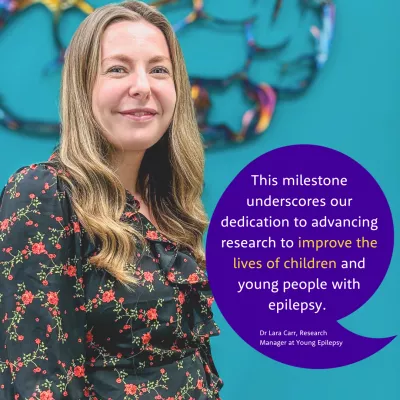We are delighted to announce that Young Epilepsy has joined the Association of Medical Research Charities (AMRC) as an Introductory Member marking a significant step forward in our commitment to driving research and placing it at the heart of our organisation.
The importance of research
Epilepsy is a condition that affects over 100,000 children and young people in the UK. Research into the impact, causes, and treatments of epilepsy is crucial for improving the lives of those affected. By joining the AMRC, we are taking a pivotal step towards enhancing our research capabilities and driving forward our mission to better understand and treat childhood epilepsy.
About the AMRC
The AMRC is a membership organisation dedicated to supporting medical research charities in saving and improving lives through research and innovation. They ensure that member charities fund the best research by developing guides, providing training, and auditing funding processes. The AMRC unites and champions the sector, driving positive change in the research and health landscape.
I am thrilled about our new Introductory Membership with the AMRC. This milestone underscores our dedication to advancing research to improve the lives of children and young people with epilepsy. We look forward to working towards full membership, which will position us to make even greater strides in understanding, treating and supporting all those affected by childhood epilepsy.Dr Lara Carr, Young Epilepsy Research Manager

Benefits of Our Membership
Influence:
- We will have a collective voice in consultations and inquiries, ensuring that the perspectives of our community are heard and acted upon.
- Our stance on key sector issues will be communicated through position statements, helping to drive positive change.
Connect:
- We will participate in meetings, networks, and events that connect member charities and key stakeholders, fostering collaborations that deliver benefits to patients sooner.
Support:
- We will receive guidance and training to help us meet the Full membership criteria.
- Our member charities have access to an open publishing platform called Health Open Research, enabling them to openly and rapidly publish the results of research they fund.
Our Research Focus
Young Epilepsy remains dedicated to understanding childhood epilepsies, advancing treatments, and providing outstanding support. Our research partnership, led by Professor Helen Cross OBE, focuses on three key workstreams:
- Understanding Childhood Epilepsies:
Around half of people diagnosed with epilepsy never learn the cause of it. Early diagnosis is crucial for better management and treatment of the condition.
- Outstanding Treatment:
Epilepsy treatments have not changed significantly in recent years. We aim to make advances in imaging, surgery, dietetics, genomics, targeted treatments, and new medicines to effectively treat and potentially cure epilepsy.
- Outstanding Support:
Beyond treatment, we address the wider challenges associated with growing up with epilepsy. We aim to put in place the right systems and supports for children, young people, and their families.
Find out more about our research here.
How You Can Get Involved
Join the E-CURe Network: E-CURe is a dedicated network of young people with epilepsy and their parents/caregivers. Their experiences help us develop research projects across our workstreams, strengthening the voice of children and young people in all our research. If you’d like to add your voice and ensure our research is answering the right questions in the right way, please sign up to the E-CURe network here: Help our research | Young Epilepsy
Help Fund World-Leading Studies: We are currently fundraising for studies to change the way childhood epilepsy is diagnosed, treated, and supported. Examples of our key ongoing projects include:
- An innovative OPM-MEG brain scanner for children and young people.
- Mapping patterns for earlier treatment in epilepsy.
- The Mental Health Intervention for Children with Epilepsy (MICE) project.
Join us in our mission to drive forward research and improve the lives of children and young people with epilepsy.


